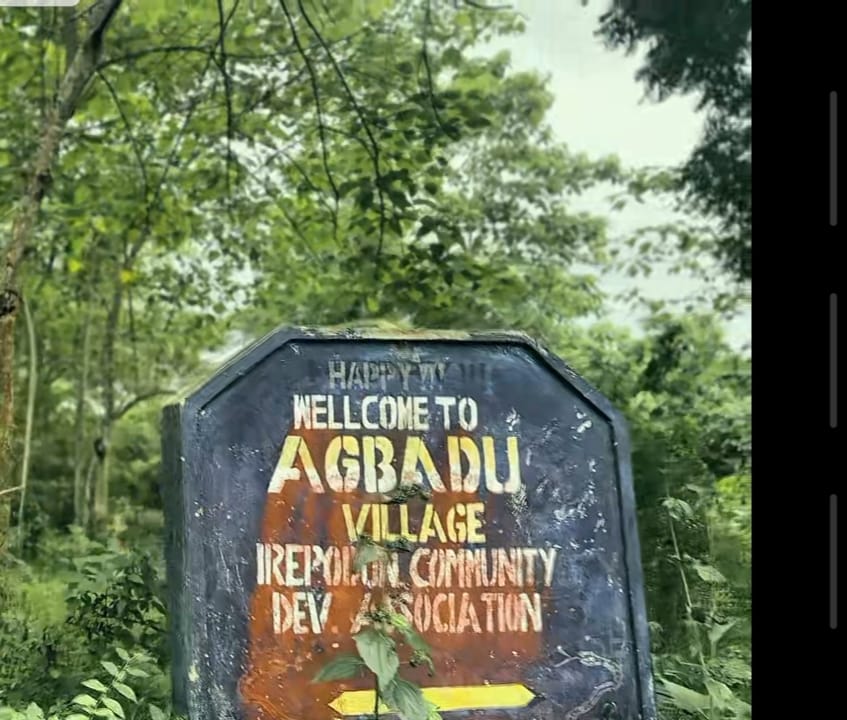Olagoke Adams, Muraina Lateef, Adesanya Adeola & Adeyemi Hakeem
Just a stone’s throw behind Moshood Abiola Polytechnic (MAPOLY) in Abeokuta, Ogun State, lies a community that has been left behind by time and policy. Agbadu Village, home to generations of Ijemo Agbadu people, stands today as a portrait of neglect — a settlement stripped of basic amenities, facing the dual threats of institutional expansion and encroaching herders.
For decades, the villagers survived on cassava farming, cultivating the same lands their forefathers tilled. But now, their existence is under siege. On one side, MAPOLY’s expansion threatens to bulldoze homes and farmlands; on the other, Fulani herders graze on the little crops the villagers manage to plant, heightening tensions and wiping out livelihoods.
“Our children are growing without light, without water, without education. If government sees us as human, why do they leave us this way?” lamented Abiola Owolabi, a father of five.
A Community Without Basics
The story of Agbadu is not just about poverty. It is about absence. They lack many things include water; schools; hospitals; electricity and roads.
On Water: PLATFORM TIMES observed that there is no borehole. Residents rely on a muddy, stagnant stream. To make the water drinkable, they throw in shangite stone to settle the dirt. The process takes 24 hours, yet the risk remains. Typhoid and diarrhoea are rampant. “We drink sickness daily,” one villager said bitterly.
On Education: Not a single primary or secondary school exists in Agbadu. Children grow up unschooled, thrust into farm labour before they can spell their names. According to UNICEF, 10.5 million Nigerian children are out of school — and Agbadu contributes to that grim statistic.
On Health: There is no clinic. A woman in labour or a child with malaria must be rushed by motorcycle to Onikolobo or further, sometimes with fatal consequences. Nigeria already suffers from one of the highest maternal mortality rates in the world, and Agbadu’s isolation makes matters worse.
On Electricity: No power lines have ever reached the village. The nights are pitch dark, lit only by firewood flames and weak torchlights.
On Roads: The single path to Agbadu is narrow, broken, and muddy. During rainy seasons, it becomes impassable, cutting residents off from nearby towns.
MAPOLY’s Side of the Story
For balance, PLATFORM TIMES reached out to Mr. Yemi Ajibola, MAPOLY’s Public Relations Officer. He admitted that Agbadu is a host community but insisted the relationship collapsed due to the “excesses” of residents.
“We have at different times treated Agbadu as one of our publics,” Ajibola explained.
According to him, MAPOLY once provided borehole water, opened its internal roads to villagers, and held discussions about their needs. But the goodwill stopped when villagers allegedly sold off parts of MAPOLY’s land to outsiders; farmed within MAPOLY’s property without authorization and apropriated spaces meant for institutional projects.
“These actions made it difficult to continue extending support without protecting the polytechnic’s assets,” Ajibola concluded.
Between Truth and Survival
The standoff has left Agbadu hanging between neglect and accusation. MAPOLY insists on safeguarding its assets, while villagers say they have been abandoned and stripped of dignity.
At the centre of the conflict is government silence. Despite appeals from Chief Micheal Bamgbose, the village head, alongside neighbouring communities like Agejo and Adekanbi, neither the Ogun State Government nor the Obafemi-Owode Local Government has intervened. Even the palace of the Alake of Egbaland has remained quiet.
Walking through Agbadu feels like stepping into a paradox. Children play barefoot by a filthy stream.
Women pound cassava under thatched roofs. Elders sit under mango trees, debating whether bulldozers will arrive tomorrow.
A Cry for Justice
Agbadu is not asking for luxury. The community’s demand is simple: water, schools, health, and security. They are asking not to be erased from the land of their ancestors.
Chief Bamgbose captures the sentiment:“We are not squatters. We are custodians. If this land goes, our history and our name will vanish with it.”
The question remains: Will Ogun State and MAPOLY allow an ancestral community to disappear in the name of development, or will they rise to balance progress with justice?
Until then, Agbadu stands forgotten — waiting for recognition, for fairness, for survival.
This Special Report was produced by Progressive Media Group; 6th Set, Mass Communication Department, Al-Hikmah University in conjunction with Ebenezer Obey Music Life and Institute Study Centre, Abeokuta, Ogun State.
Do you want to share a story with us? Do you want to advertise with us? Do you need publicity for a product, service, or event? Contact us on WhatsApp +2348183319097 Email: platformtimes@gmail.com
We are committed to impactful investigative journalism for human interest and social justice. Your donation will help us tell more stories. Kindly donate any amount HERE




